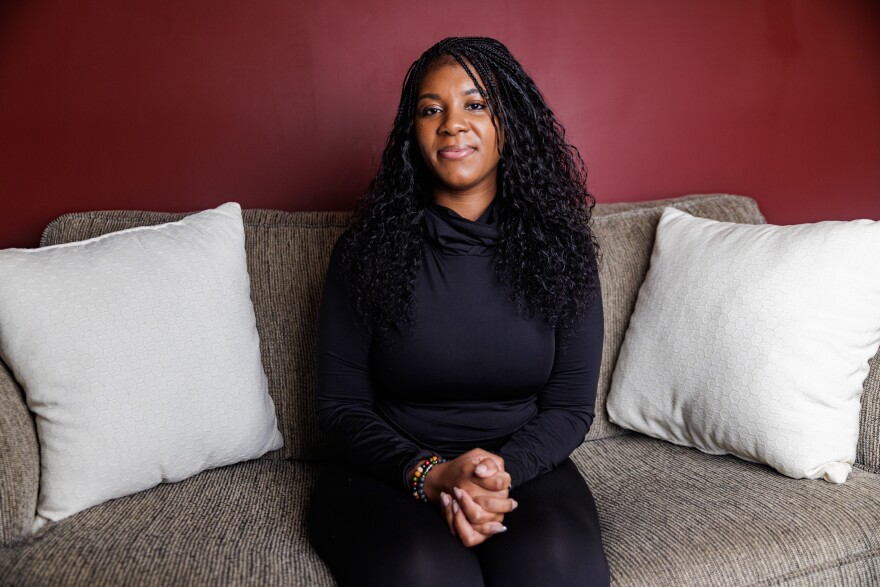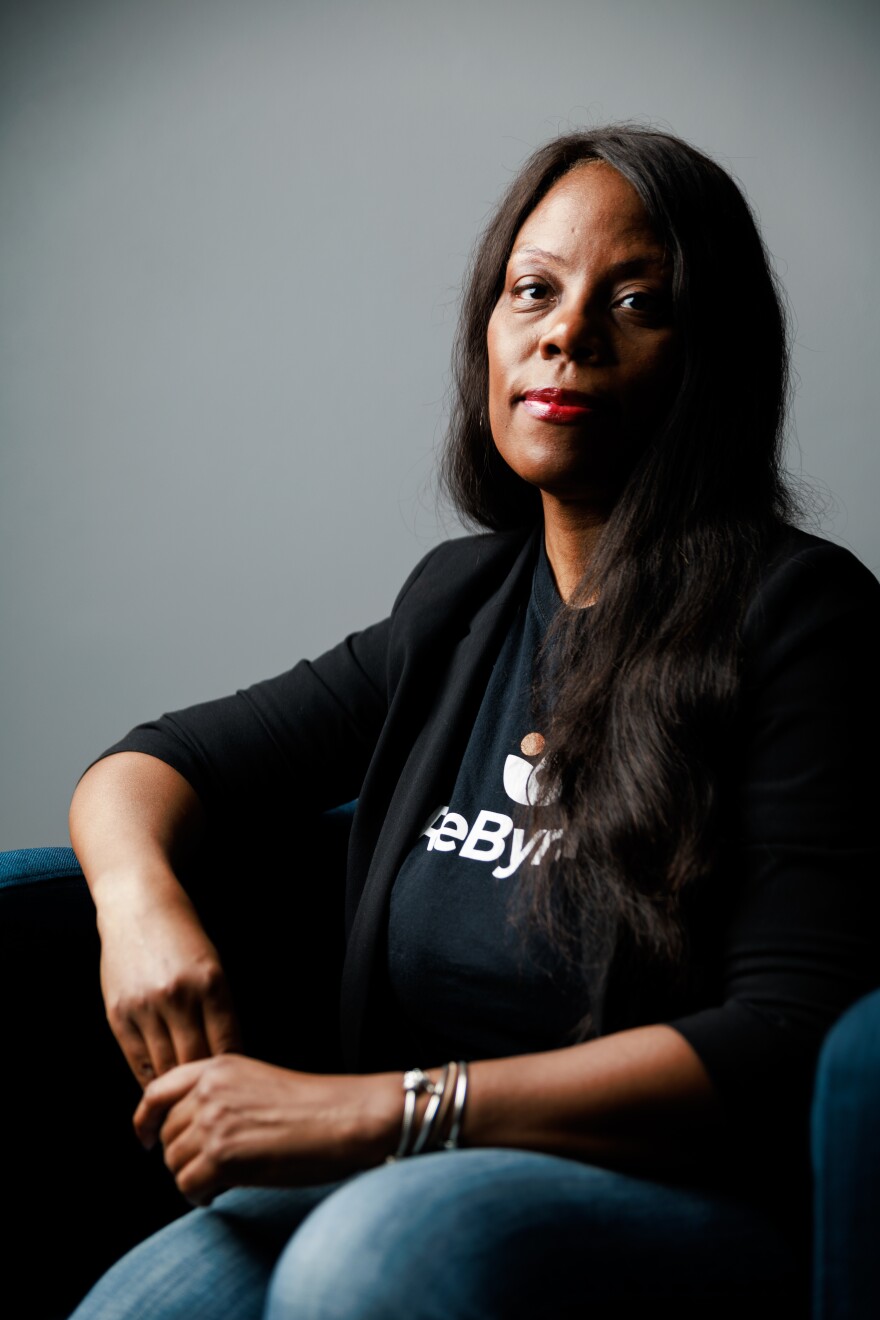Stephanie Spencer remembers trying to call rideshare services to take pregnant women to doctor’s appointments during the pandemic. Spencer is founder of Urban Baby Beginnings, which provides free maternal services in Virginia.
“And the Lyft drivers were asking, ‘Are they sick?’ Because they thought that what they were going into was this COVID hotspot,” Spencer said.
Transportation was tough for some moms. And hospitals were limiting visitors.
“You tell a mom … she can't bring her children — because now remember, her children can't go to day care because day cares were closed,” Spencer said. “What am I supposed to do?”
The maternal mortality rate in Virginia more than doubled between 2018 and 2020. And research shows Black women are much more likely to die during or after childbirth than their white peers.
Many women feared going to the hospital for checkups – and early on were advised against taking the COVID-19 vaccine. All of this had real consequences for some pregnant patients.
“We had a lot of people who were saying … ’I would rather take my chances,’” Spencer said. “‘Because if I've got to go to that hospital and something happens, and I catch COVID, I don't know if something's going to happen to me or my baby. I can't have that.’ And that has continued to linger.”
The pandemic played a role in the rise in maternal mortality, said Jordan Hylton with VCU Health’s OB-GYN department.
“Some women even who got the vaccine were so scared to come in public or come into a hospital setting until it was time for delivery, where we may have missed an opportunity to intervene with another medical comorbidity that they had to set them up for success,” Hylton said.
Hylton noted that pregnant people should have at least eight checkups during pregnancy.
“And we know we weren't getting that in COVID,” Hylton said. “We were really trying to play it safe and ensure safety in other ways. But I think that showed us how important it really is to have these touch points and have these meetings with patients.”

Missing appointments can mean missing signs of high blood pressure. Cardiac conditions were the leading cause of death among Black women during or soon after pregnancy from 2018 to 2020.
Luckily for Chester resident Shalisha Wilcox, her doctor, Daphne Bazile, recognized that Wilcox’s blood pressure was spiking — while at a routine visit a couple of weeks before her due date.
“She'd been fine, normal blood pressures every week. Weight was great,” Bazile told VPM News. “And then she walked in and I looked at her and I was like, ‘Wait a minute. You don't look right.’”
Bazile told Wilcox she needed to be induced immediately. She looked puffy and swollen, all signs of preeclampsia — a serious blood pressure condition that can develop during pregnancy. Black women are more likely to develop the condition.
“She told me I had about 30 minutes to get home and grab whatever bag I had and get to the hospital,” Wilcox said. “She said: ‘You’re gonna have the baby.’”
Later when her blood pressure spiked again, hospital staff had to use a vacuum to deliver Wilcox’s son.
“At that moment,” Wilcox said, “[Bazile] looked at the monitor and she saw I was at a very critical level to where I could have had a heart attack.”
In 2020, 42 Virginia women died of heart-related problems and other natural causes during or shortly after childbirth, compared to just 17 two years prior. Thirteen were Black.
Melanie Rouse with the Virginia Department of Health coordinates the state’s maternal mortality review team. She said Virginia’s uptick in deaths during the pandemic reflects a national trend and added that the natural causes of maternal deaths in 2020 “tended to be similar to what we’ve seen in previous years.”
That means the pandemic is not the only factor at play. Barriers to care like transportation and child care pre-date the pandemic, as does racial bias.
Spencer with Urban Baby Beginnings said Black women can be hesitant to seek medical care because their pain is often dismissed. And research backs this up.
Not being believed can mean getting turned away when seeking treatment.

“I go into the system that I'm supposed to trust, is supposed to care for me. And the first thing someone does is look at me and say, ‘I don't think that you look sick enough,’” Spencer said. “‘You're not writhing on the floor. This isn't big, this is not a problem,’ And that's what my moms deal with all the time.”
Spencer said health systems are starting to pay more attention to the country’s high mortality rate, especially with new research confirming many deaths could’ve been avoided. A study published by the Centers for Disease Control and Prevention last year found that of the 1,018 pregnancy-related deaths among residents of 36 states between 2017 and 2019, 855 (84%) were preventable.
“Before that, Spencer said, "You might as well have hung it up. It was really difficult for people to understand what was going on.”
VCU Health now has medical interpreters available to help translate conversations for pregnant people not fluent in English for inpatient and outpatient visits. Health systems are trying to address other ongoing problems that can contribute to maternal mortality, like the issue of getting patients to their appointments.
Medicaid provides transportation services, but VCU’s Hylton said the rides typically need to be scheduled a month in advance. Hylton also said VCU Health now works to schedule patients' appointments months in advance, for the duration of their pregnancies.
Bon Secours is also offering some weekend appointments to accommodate the schedules of women who may not be able to leave work during the week. Southside Obstetrics and Gynecology is in the process of expanding weekend clinic hours. A spokesperson said specific dates and hours have not yet been finalized, but the practice looks forward to piloting Saturday hours in the next few weeks.
Urban Baby Beginnings has also partnered with VCU Health and Bon Secours to provide on-site free doulas for low-income patients. While not typically medically trained, doulas provide emotional and physical guidance during and after pregnancy.
Medicaid now covers doula services for Virginia patients, which has helped make these partnerships possible. Spencer said many patients have mentioned that their childbirth experiences in the hospital have been less stressful with the help of doulas.
“Having someone in that clinical space that was a trusted resource that was still community-based, but also able to be a liaison, really bridged a gap and created a trusting structure with everyone,” Spencer said.




